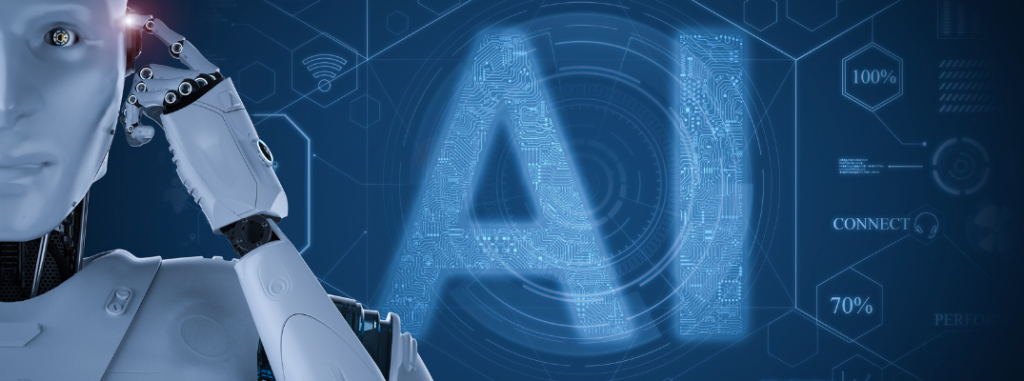The human race is in the wake of another massive industrial revolution; the fourth industrial revolution. Unlike previous revolutions, the fourth industrial revolution is majorly digital and thrives on its ability to merge diverse technologies to close the gaps between the physical, digital and biological worlds.
At the heart of this industrial revolution is Artificial Intelligence (AI) which has become a buzzword in our media today. According to encyclopedia Britannica, AI is “applied to the project of developing systems endowed with the intellectual processes characteristic of humans such as the ability to reason, discover meaning or learn from past experiences.” The reality of AI has come upon us and is greatly impacting our lives. From driverless cars, to bionic brains, 3D printing, drone taxis, virtual assistants, robotics and translation, it is changing the way we live, work and interact in ways that were previously thought unimaginable. Several companies operating in diverse industries and even governments across the globe are now integrating AI into the very core of their day-to-day operations. But the question is: how does AI affect sustainability – a concept that integrates ethical, environmental, social, and economic concerns into a business or development strategy?
Contributions of AI to Sustainable Development
Economic: An unprecedented access to global digital platforms and the ready availability of vast data occasioned by AI is no doubt improving human lives and even holds greater promises in the near future because we are yet to even scratch the surface of AI development. Companies are now using their access to global data to improve the design and development of new products and services; examples are Siri by Apple and Alexa by Amazon.
On a global level, AI is set to open new vistas of opportunities and steer the ship of global economic growth to the shores of immense prosperity as it has the potential to stimulate and strengthen global communication and supply chain systems.
Environmental: To reduce their environmental footprint, some organizations have developed systems that track emissions. Google for example now uses AI to check and reduce energy use in its data centers by about 20%. In the same vein, Xcel Energy Incorporated, an energy provider based in the United States of America has equipped its smokestack in Texas with neural networks that can analyze and make valuable recommendations on how to adjust the plant’s operations to reduce the emission of nitrous oxide commonly known as laughing gas; a dangerous green house gas which contributes to global warming.
Social: With the promise of driverless cars and drone taxis, AI can significantly reduce the stress and fatigue associated with driving for humans thereby improving quality of life. It will also reduce the rate of road traffic accidents and the use of fossil fuel like petrol and diesel will decline as most driverless cars operate on batteries. Subsequently, reduction in the use of fossil fuel might as well put an end to communal clashes that have become a menace in many oil producing communities across the globe.
However, while we are basking in the joy of the endless possibilities that AI presents, we should not forget to reflect on the inherent risks that it portends.
Risks of AI
Economic: The greatest fear that people have about the integration of AI into business models and practices is that it will widen the gap between returns to capital and returns to labor, that is, huge differences in benefits that accrue to innovators, investors, shareholders on one hand and that which accrues to workers on the other hand. In addition, many individuals may lose their jobs as intelligent machines are deployed to carry out complex tasks. It has been established that all these can aggravate socio-political tensions.
Social: According to Internet World Stats in December 2017, there are over 4 billion internet users in the world and Michael Yardney also postulates that there would be about 50 billion connected devices by the year 2020. This continued surge in the number of people connected to the world wide web and the access that huge corporations and governments have to people’s data questions our notion of privacy. It also raises a big human rights concern as easy access to peoples’ data will give governments unlimited powers to exercise more control on citizens based on the access they have to the global digital infrastructure.
Moreover, as artificial intelligence makes the development and deployment of lethal autonomous weapons and bio-weapons easier, human lives would be at the mercy of deviant groups and individuals who can wreak havoc on the human race with these instruments of mass destruction.
Environmental: Also, the fact that machines will drive cars instead of humans means that unlike before, human beings would travel more miles, send their cars driving instead of paying outrageous parking bills and even put those who were previously unable to drive – children, the elderly and the physically challenged – on the road thereby increasing traffic congestion and emissions.
Adaptation
To forestall imminent danger and not to repeat the mistakes of past eras, it is important that we raise questions and provide solutions to the risks associated with AI before they come upon us. Organisations and businesses, therefore, need to invest heavily in sustainability research to ascertain what their actions mean for sustainability and how to mitigate the negative impacts of AI on sustainability. Enterprises also need to adopt the ethos of sustainable capitalism and corporate social responsibility as the bedrock upon which their business strategies are premised.
Moreover, there’s an urgent need to adjust our education systems to one that dwells heavily on STEM (science, technology, engineering, and mathematics) to prepare students for today’s digital workplace. In addition, nations in the developing world should invest in technology innovation and or emulation so as not to fester the issue of inequality among nations.
“History has taught us many things. When you have powerful technologies, you have a responsibility to ensure that they are introduced the right way.” – Ginni Rometty, CEO of IBM

